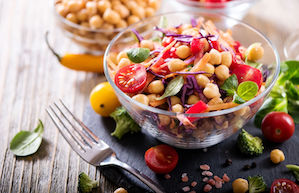Research shows a healthy diet, along with regular exercise and steps to reduce stress, can help lower the risk of getting cancer and keep recurrence at bay.
Include whole grains and roughage
Make whole grains and starchy foods high in roughage part of most meals, advises the Cancer Association of South Africa (CANSA). "Have starchy foods in the form of minimally processed or whole grains, legumes and root vegetables, rather than as refined starches and sugars," says Megan Pentz-Kluyts, CANSA’s consulting registered dietitian.
This includes minimally processed wheat, oats, rye, corn, rice, bulgar and barley, as consuming them may lower your chance of getting breast cancer, or if you’ve already had had it, of it recurring. They also offer protection against cardiovascular disease – and breast cancer survivors can be at greater risk of this as some treatments may damage the heart.
Eat at least five to seven helpings of vegetables and fruit a day
Studies in publications, such as the American Journal of Clinical Nutrition, suggest that this habit can not only reduce your risk of getting breast cancer, but help protect you from the most aggressive types of tumours. Vegetables and fruit are also low in kilojoules (when you steam or bake them or eat them raw), and high in fibre (especially if you eat them with their skins), helping you to feel full and controlling your weight – which is key for keeping breast cancer at bay, says Pentz-Kluyts.
Flavonoids (chemicals in certain plants) have specifically been linked to lower risk of breast cancer, and two kinds – flavonols (in broccoli, onions and tea) and flavones (in celery, parsley and chamomile) – have been found to be especially protective after menopause. Carotenoids in orange, yellow and dark green vegetables and fruits (carrots, pumpkin, sweet potatoes, spinach, kale, cantaloup) have also been linked to lower breast cancer risk.
Include soy-based foods such as soy milk, tofu and edamame
These have phytoestrogens – plant chemicals similar to oestrogen. Soy was once suspected of fuelling the growth of breast cancer cells, but the American Cancer Society’s 2012 nutrition guidelines concluded that research found no harmful effects, and some showed "a reduced risk of breast cancer development or recurrence". The efficacy of soy supplements, however, is still under review.
Get enough vitamin D
Low levels have been linked to a greater chance of breast cancer, and may play a part in tumour growth. Vitamin D is known as the sunshine vitamin, which your body makes when exposed to sunlight. You need 10 minutes of unprotected exposure several times a week, but can also add vitamin D to your diet with salmon, herring, sardines and mackerel, as well as fortified milk, yoghurt and orange juice.
Cut back on added sugar
Sugar won’t, as some claim, fuel cancer cells so they grow more rapidly, but regularly having too much sugar can lead to obesity and other conditions that raise your risk of cancer, says Pentz-Kluyts.
Watch your fat intake
Limit your intake of saturated fats (animal fats such as in butter and fatty meats), and trans fats (in fried foods and commercial baked products). Opt for lean protein such as fish and skinless chicken, and for plant proteins (such as beans, lentils and soya), and plant oils, such as canola. Canola oil is rich in omega-3 and has the more beneficial ratio (2:1) of omega-6 to omega-3, according to CANSA. Raw nuts, avocado and extra virgin olive oil are also recommended. Especially avoid processed, cured or smoked meats (biltong, bacon, polony, ham, viennas). "Cured and preserved foods often have a high salt content," says Pentz-Kluyts.
Cut out - or watch - your alcohol intake
Lastly, cut out alcohol if you can. "There’s strong evidence alcohol causes cancer at seven sites in the body, and possibly others, including the breast," says Pentz-Kluyts. "Drink plenty of water to help food move through your digestive system and carry nutrients to the cells, and have rooibos tea, which is rich in antioxidants."
IMAGE CREDIT: 123rf.com

